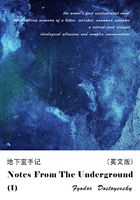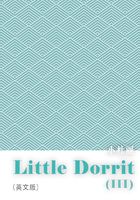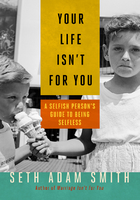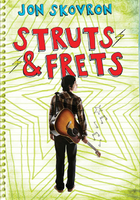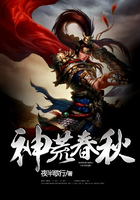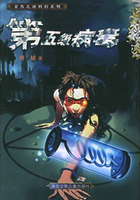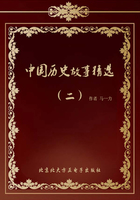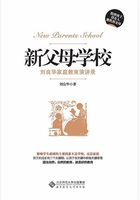She had thought that this marriage, of all marriages, would be an adventure. Not that the man himself was exactly magical to her. A little, wiry, twisted fellow, twenty years older than herself, with brown eyes and greying hair, who had come to America a scrap of a wastrel, from Holland, years ago, as a tiny boy, and from the gold-mines of the west had been kicked south into Mexico, and now was more or less rich, owning silver-mines in the wilds of the Sierra Madre: it was obvious that the adventure lay in his circumstances, rather than his person. But he was still a little dynamo of energy, in spite of accidents survived, and what he had accomplished he had accomplished alone. One of those human oddments there is no accounting for.
When she actually?saw?what he had accomplished, her heart quailed. Great green-covered, unbroken mountain-hills, and in the midst of the lifeless isolation, the sharp pinkish mounds of the dried mud from the silver-works. Under the nakedness of the works, the walled-in, one-storey adobe house, with its garden inside, and its deep inner verandah with tropical climbers on the sides. And when you looked up from this shut-in flowered patio, you saw the huge pink cone of the silver-mud refuse, and the machinery of the extracting plant against heaven above. No more.
To be sure, the great wooden doors were often open. And then she could stand outside, in the vast open world. And see great, void, tree-clad hills piling behind one another, from nowhere into nowhere. They were green in autumn time. For the rest, pinkish, stark dry, and abstract.
And in his battered Ford car her husband would take her into the dead, thrice-dead little Spanish town forgotten among the mountains. The great, sundried dead church, the dead portales, the hopeless covered market-place, where, the first time she went, she saw a dead dog lying between the meat stalls and the vegetable array, stretched out as if for ever, nobody troubling to throw it away. Deadness within deadness.
Everybody feebly talking silver, and showing bits of ore. But silver was at a standstill. The great war came and went. Silver was a dead market. Her husband's mines were closed down. But she and he lived on in the adobe house under the works, among the flowers that were never very flowery to her.
She had two children, a boy and a girl. And her eldest, the boy, was nearly ten years old before she aroused from her stupor of subjected amazement. She was now thirty-three, a large, blue-eyed, dazed woman, beginning to grow stout. Her little, wiry, tough, twisted, brown-eyed husband was fifty-three, a man as tough as wire, tenacious as wire, still full of energy, but dimmed by the lapse of silver from the market, and by some curious inaccessibility on his wife's part.
He was a man of principles, and a good husband. In a way, he doted on her. He never quite got over his dazzled admiration of her. But essentially, he was still a bachelor. He had been thrown out on the world, a little bachelor, at the age of ten. When he married he was over forty, and had enough money to marry on. But his capital was all a bachelor's. He was boss of his own works, and marriage was the last and most intimate bit of his own works.
He admired his wife to extinction, he admired her body, all her points. And she was to him always the rather dazzling Californian girl from Berkeley, whom he had first known. Like any sheik, he kept her guarded among those mountains of Chihuahua. He was jealous of her as he was of his silver-mine: and that is saying a lot.
At thirty-three she really was still the girl from Berkeley, in all but physique. Her conscious development had stopped mysteriously with her marriage, completely arrested. Her husband had never become real to her, neither mentally nor physically. In spite of his late sort of passion for her, he never meant anything to her, physically. Only morally he swayed her, downed her, kept her in an invincible slavery.
So the years went by, in the adobe house strung round the sunny patio, with the silver-works overhead. Her husband was never still. When the silver went dead, he ran a ranch lower down, some twenty miles away, and raised pure-bred hogs, splendid creatures. At the same time, he hated pigs. He was a squeamish waif of an idealist, and really hated the physical side of life. He loved work, work, work, and making things. His marriage, his children, were something he was making, part of his business, but with a sentimental income this time.
Gradually her nerves began to go wrong: she must get out. She must get out. So he took her to El Paso for three months. And at least it was the United States.
But he kept his spell over her. The three months ended: back she was, just the same, in her adobe house among those eternal green or pinky-brown hills, void as only the undiscovered is void. She taught her children, she supervised the Mexican boys who were her servants. And sometimes her husband brought visitors, Spaniards or Mexicans or occasionally white men.
He really loved to have white men staying on the place. Yet he had not a moment's peace when they were there. It was as if his wife were some peculiar secret vein of ore in his mines, which no one must be aware of except himself. And she was fascinated by the young gentlemen, mining engineers, who were his guests at times. He, too, was fascinated by a real gentleman. But he was an old-timer miner with a wife, and if a gentleman looked at his wife, he felt as if his mine were being looted, the secrets of it pryed out.
It was one of these young gentlemen who put the idea into her mind. They were all standing outside the great wooden doors of the patio, looking at the outer world. The eternal, motionless hills were all green, it was September, after the rains. There was no sign of anything, save the deserted mine, the deserted works, and a bunch of half-deserted miner's dwellings.
"I wonder," said the young man, "what there is behind those great blank hills."
"More hills," said Lederman. "If you go that way, Sonora and the coast. This way is the desert—you came from there—And the other way, hills and mountains."
"Yes, but what?lives?in the hills and mountains??Surely?there is something wonderful? It looks?so?like nowhere on earth: like being on the moon."
"There's plenty of game, if you want to shoot. And Indians, if you call?them?wonderful."
"Wild ones?"
"Wild enough."
"But friendly?"
"It depends. Some of them are quite wild, and they don't let anybody near. They kill a missionary at sight. And where a missionary can't get, nobody can."
"But what does the government say?"
"They're so far from everywhere, the government leaves 'em alone. And they're wily; if they think there'll be trouble, they send a delegation to Chihuahua and make a formal submission. The government is glad to leave it at that."
"And do they live quite wild, with their own savage customs and religion?"
"Oh, yes. They use nothing but bows and arrows. I've seen them in town, in the Plaza, with funny sort of hats with flowers round them, and a bow in one hand, quite naked except for a sort of shirt, even in cold weather—striding round with their savage's bare legs."
"But don't you suppose it's wonderful, up there in their secret villages?"
"No. What would there be wonderful about it? Savages are savages, and all savages behave more or less alike: rather low-down and dirty, unsanitary, with a few cunning tricks, and struggling to get enough to eat."
"But surely they have old, old religions and mysteries—it?must?be wonderful, surely it must."
"I don't know about mysteries—howling and heathen practices, more or less indecent. No, I see nothing wonderful in that kind of stuff. And I wonder that you should, when you have lived in London or Paris or New York—"
"Ah,?everybody?lives in London or Paris or New York"—said the young man, as if this were an argument.
And his peculiar vague enthusiasm for unknown Indians found a full echo in the woman's heart. She was overcome by a foolish romanticism more unreal than a girl's. She felt it was her destiny to wander into the secret haunts of these timeless, mysterious, marvellous Indians of the mountains.
She kept her secret. The young man was departing, her husband was going with him down to Torreon, on business:—would be away for some days. But before the departure, she made her husband talk about the Indians: about the wandering tribes, resembling the Navajo, who were still wandering free; and the Yaquis of Sonora: and the different groups in the different valleys of Chihuahua State.
There was supposed to be one tribe, the Chilchuis, living in a high valley to the south, who were the sacred tribe of all the Indians. The descendants of Montezuma and of the old Aztec or Totonac kings still lived among them, and the old priests still kept up the ancient religion, and offered human sacrifices—so it was said. Some scientists had been to the Chilchui country, and had come back gaunt and exhausted with hunger and bitter privation, bringing various curious, barbaric objects of worship, but having seen nothing extraordinary in the hungry, stark village of savages.
Though Lederman talked in this off-hand way, it was obvious he felt some of the vulgar excitement at the idea of ancient and mysterious savages.
"How far away are they?" she asked.
"Oh—three days on horseback—past Cuchitee and a little lake there is up there."
Her husband and the young man departed. The woman made her crazy plans. Of late, to break the monotony of her life, she had harassed her husband into letting her go riding with him, occasionally, on horseback. She was never allowed to go out alone. The country truly was not safe, lawless and crude.
But she had her own horse, and she dreamed of being free as she had been as a girl, among the hills of California.
Her daughter, nine years old, was now in a tiny convent in the little half-deserted Spanish mining-town five miles away.
"Manuel," said the woman to her house-servant, "I'm going to ride to the convent to see Margarita, and take her a few things. Perhaps I shall stay the night in the convent. You look after Freddy and see everything is all right till I come back."
"Shall I ride with you on the master's horse, or shall Juan?" asked the servant.
"Neither of you. I shall go alone."
The young man looked her in the eyes, in protest. Absolutely impossible that the woman should ride alone!
"I shall go alone," repeated the large, placid-seeming, fair-complexioned woman, with peculiar overbearing emphasis. And the man silently, unhappily yielded.
"Why are you going alone, mother?" asked her son, as she made up parcels of food.
"Am I?never?to be let alone? Not one moment of my life?" she cried, with sudden explosion of energy. And the child, like the servant, shrank into silence.
She set off without a qualm, riding astride on her strong roan horse, and wearing a riding suit of coarse linen, a riding skirt over her linen breeches, a scarlet neck-tie over her white blouse, and a black felt hat on her head. She had food in her saddle-bags, an army canteen with water, and a large, native blanket tied on behind the saddle. Peering into the distance, she set off from her home. Manuel and the little boy stood in the gateway to watch her go. She did not even turn to wave them farewell.
But when she had ridden about a mile, she left the wild road and took a small trail to the right, that led into another valley, over steep places and past great trees, and through another deserted mining-settlement. It was September, the water was running freely in the little stream that had fed the now-abandoned mine. She got down to drink, and let the horse drink too.
She saw natives coming through the trees, away up the slope. They had seen her, and were watching her closely. She watched in turn. The three people, two women and a youth, were making a wide detour, so as not to come too close to her. She did not care. Mounting, she trotted ahead up the silent valley, beyond the silver-works, beyond any trace of mining. There was still a rough trail, that led over rocks and loose stones into the valley beyond. This trail she had already ridden, with her husband. Beyond that she knew she must go south.
Curiously she was not afraid, although it was a frightening country, the silent, fatal-seeming mountain-slopes, the occasional distant, suspicious, elusive natives among the trees, the great carrion birds occasionally hovering, like great flies, in the distance, over some carrion or some ranch house or some group of huts.
As she climbed, the trees shrank and the trail ran through a thorny scrub, that was trailed over with blue convolvulus and an occasional pink creeper. Then these flowers lapsed. She was nearing the pine-trees.
She was over the crest, and before her another silent, void, green-clad valley. It was past midday. Her horse turned to a little runlet of water, so she got down to eat her midday meal. She sat in silence looking at the motionless unliving valley, and at the sharp-peaked hills, rising higher to rock and pine-trees, southwards. She rested two hours in the heat of the day, while the horse cropped around her.
Curious that she was neither afraid nor lonely. Indeed, the loneliness was like a drink of cold water to one who is very thirsty. And a strange elation sustained her from within.
She travelled on, and camped at night in a valley beside a stream, deep among the bushes. She had seen cattle and had crossed several trails. There must be a ranch not far off. She heard the strange wailing shriek of a mountain-lion, and the answer of dogs. But she sat by her small camp fire in a secret hollow place and was not really afraid. She was buoyed up always by the curious, bubbling elation within her.
It was very cold before dawn. She lay wrapped in her blanket looking at the stars, listening to her horse shivering, and feeling like a woman who has died and passed beyond. She was not sure that she had not heard, during the night, a great crash at the centre of herself, which was the crash of her own death. Or else it was a crash at the centre of the earth, and meant something big and mysterious.
With the first peep of light she got up, numb with cold, and made a fire. She ate hastily, gave her horse some pieces of oil-seed cake, and set off again. She avoided any meeting—and since she met nobody, it was evident that she in turn was avoided. She came at last in sight of the village of Cuchitee, with its black houses with their reddish roofs, a sombre, dreary little cluster below another silent, long-abandoned mine. And beyond, a long, great mountain-side, rising up green and light to the darker, shaggier green of pine trees. And beyond the pine trees stretches of naked rock against the sky, rock slashed already and brindled with white stripes of snow. High up, the new snow had already begun to fall.
And now, as she neared, more or less, her destination, she began to go vague and disheartened. She had passed the little lake among yellowing aspen trees whose white trunks were round and suave like the white round arms of some woman. What a lovely place! In California she would have raved about it. But here she looked and saw that it was lovely, but she didn't care. She was weary and spent with her two nights in the open, and afraid of the coming night. She didn't know where she was going, or what she was going for. Her horse plodded dejectedly on, towards that immense and forbidding mountain-slope, following a stony little trail. And if she had had any will of her own left, she would have turned back, to the village, to be protected and sent home to her husband.
But she had no will of her own. Her horse splashed through a brook, and turned up a valley, under immense yellowing cotton-wood trees. She must have been near nine thousand feet above sea-level, and her head was light with the altitude and with weariness. Beyond the cotton-wood trees she could see, on each side, the steep sides of mountain-slopes hemming her in, sharp-plumaged with overlapping aspen, and, higher up, with sprouting, pointed spruce and pine tree. Her horse went on automatically. In this tight valley, on this slight trail, there was nowhere to go but ahead, climbing.
Suddenly her horse jumped, and three men in dark blankets were on the trail before her.
"Adios!" came the greeting, in the full, restrained Indian voice.
"Adios!" she replied, in her assured, American woman's voice.
"Where are you going?" came the quiet question, in Spanish.
The men in the dark sarapes had come closer, and were looking up at her.
"On ahead," she replied coolly, in her hard, Saxon Spanish.
These were just natives to her: dark-faced, strongly-built men in dark sarapes and straw hats. They would have been the same as the men who worked for her husband, except, strangely, for the long black hair that fell over their shoulders. She noted this long black hair with a certain distaste. These must be the wild Indians she had come to see.
"Where do you come from?" the same man asked. It was always the one man who spoke. He was young, with quick, large, bright black eyes that glanced sideways at her. He had a soft black moustache on his dark face, and a sparse tuft of beard, loose hairs on his chin. His long black hair, full of life, hung unrestrained on his shoulders. Dark as he was, he did not look as if he had washed lately.
His two companions were the same, but older men, powerful and silent. One had a thin black line of moustache, but was beardless. The other had the smooth cheeks and the sparse dark hairs marking the lines of his chin with the beard characteristic of the Indians.
"I come from far away," she replied, with half-jocular evasion.
This was received in silence.
"But where do you live?" asked the young man, with that same quiet insistence.
"In the north," she replied airily.
Again there was a moment's silence. The young man conversed quietly, in Indian, with his two companions.
"Where do you want to go, up this way?" he asked suddenly, with challenge and authority, pointing briefly up the trail.
"To the Chilchui Indians," answered the woman laconically.
The young man looked at her. His eyes were quick and black, and inhuman. He saw, in the full evening light, the faint sub-smile of assurance on her rather large, calm, fresh-complexioned face; the weary, bluish lines under her large blue eyes; and in her eyes, as she looked down at him, a half-childish, half-arrogant confidence in her own female power. But in her eyes also, a curious look of trance.
"Usted es Se?ora??You are a lady?" the Indian asked her.
"Yes, I am a lady," she replied complacently.
"With a family?"
"With a husband and two children, boy and girl," she said.
The Indian turned to his companions and translated, in the low, gurgling speech, like hidden water running. They were evidently at a loss.
"Where is your husband?" asked the young man.
"Who knows?" she replied airily. "He has gone away on business for a week."
The black eyes watched her shrewdly. She, for all her weariness, smiled faintly in the pride of her own adventure and the assurance of her own womanhood, and the spell of the madness that was on her.
"And what do?you?want to do?" the Indian asked her.
"I want to visit the Chilchui Indians—to see their houses and to know their gods," she replied.
The young man turned and translated quickly, and there was a silence almost of consternation. The grave elder men were glancing at her sideways, with strange looks, from under their decorated hats. And they said something to the young man, in deep chest voices.
The latter still hesitated. Then he turned to the woman.
"Good!" he said. "Let us go. But we cannot arrive until to-morrow. We shall have to make a camp to-night."
"Good!" she said. "I can make a camp."
Without more ado, they set off at a good speed up the stony trail. The young Indian ran alongside her horse's head, the other two ran behind. One of them had taken a thick stick, and occasionally he struck her horse a resounding blow on the haunch, to urge him forward. This made the horse jump, and threw her back in the saddle, which, tired as she was, made her angry.
"Don't do that!" she cried, looking round angrily at the fellow. She met his black, large, bright eyes, and for the first time her spirit really quailed. The man's eyes were not human to her, and they did not see her as a beautiful white woman. He looked at her with a black, bright inhuman look, and saw no woman in her at all. As if she were some strange, unaccountable?thing,?incomprehensible to him, but inimical. She sat in her saddle in wonder, feeling once more as if she had died. And again he struck her horse, and jerked her badly in the saddle.
All the passionate anger of the spoilt white woman rose in her. She pulled her horse to a standstill, and turned with blazing eyes to the man at her bridle.
"Tell that fellow not to touch my horse again," she cried. She met the eyes of the young man, and in their bright black inscrutability she saw a fine spark, as in a snake's eye, of derision. He spoke to his companion in the rear, in the low tones of the Indian. The man with the stick listened without looking. Then, giving a strange low cry to the horse, he struck it again on the rear, so that it leaped forward spasmodically up the stony trail, scattering the stones, pitching the weary woman in her seat.
The anger flew like a madness into her eyes, she went white at the gills. Fiercely she reined in her horse. But before she could turn, the young Indian had caught the reins under the horse's throat, jerked them forward, and was trotting ahead rapidly, leading the horse.
The woman was powerless. And along with her supreme anger there came a slight thrill of exultation. She knew she was dead.
The sun was setting, a great yellow light flooded the last of the aspens, flared on the trunks of the pine-trees, the pine-needles bristled and stood out with dark lustre, the rocks glowed with unearthly glamour. And through this effulgence the Indian at her horse's head trotted unweariedly on, his dark blanket swinging, his bare legs glowing with a strange transfigured ruddiness in the powerful light, and his straw hat with its half-absurd decorations of flowers and feathers shining showily above his river of long black hair. At times he would utter a low call to the horse, and then the other Indian, behind, would fetch the beast a whack with the stick.
The wonder-light faded off the mountains, the world began to grow dark, a cold air breathed down. In the sky, half a moon was struggling against the glow in the west. Huge shadows came down from steep rocky slopes. Water was rushing. The woman was conscious only of her fatigue, her unspeakable fatigue, and the cold wind from the heights. She was not aware how moonlight replaced daylight. It happened while she travelled unconscious with weariness.
For some hours they travelled by moonlight. Then suddenly they came to a standstill. The men conversed in low tones for a moment.
"We camp here," said the young man.
She waited for him to help her down. He merely stood holding the horse's bridle. She almost fell from the saddle, so fatigued.
They had chosen a place at the foot of rocks that still gave off a little warmth of the sun. One man cut pine-boughs, another erected little screens of pine-boughs against the rock for shelter, and put boughs of balsam pine for beds. The third made a small fire, to heat tortillas. They worked in silence.
The woman drank water. She did not want to eat—only to lie down.
"Where do I sleep?" she asked.
The young man pointed to one of the shelters. She crept in and lay inert. She did not care what happened to her, she was so weary, and so beyond everything. Through the twigs of spruce she could see the three men squatting round the fire on their hams, chewing the tortillas they picked from the ashes with their dark fingers, and drinking water from a gourd. They talked in low, muttering tones, with long intervals of silence. Her saddle and saddle-bags lay not far from the fire, unopened, untouched. The men were not interested in her nor her belongings. There they squatted with their hats on their heads, eating, eating mechanically, like animals, the dark sarape with its fringe falling to the ground before and behind, the powerful dark legs naked and squatting like an animal's, showing the dirty white shirt and the sort of loin-cloth which was the only other garment, underneath. And they showed no more sign of interest in her than if she had been a piece of venison they were bringing home from the hunt, and had hung inside a shelter.
After a while they carefully extinguished the fire, and went inside their own shelter. Watching through the screen of boughs, she had a moment's thrill of fear and anxiety, seeing the dark forms cross and pass silently in the moonlight. Would they attack her now?
But no! They were as if oblivious of her. Her horse was hobbled; she could hear it hopping wearily. All was silent, mountain-silent, cold, deathly. She slept and woke and slept in a semi-conscious numbness of cold and fatigue. A long, long night, icy and eternal, and she aware that she had died.

